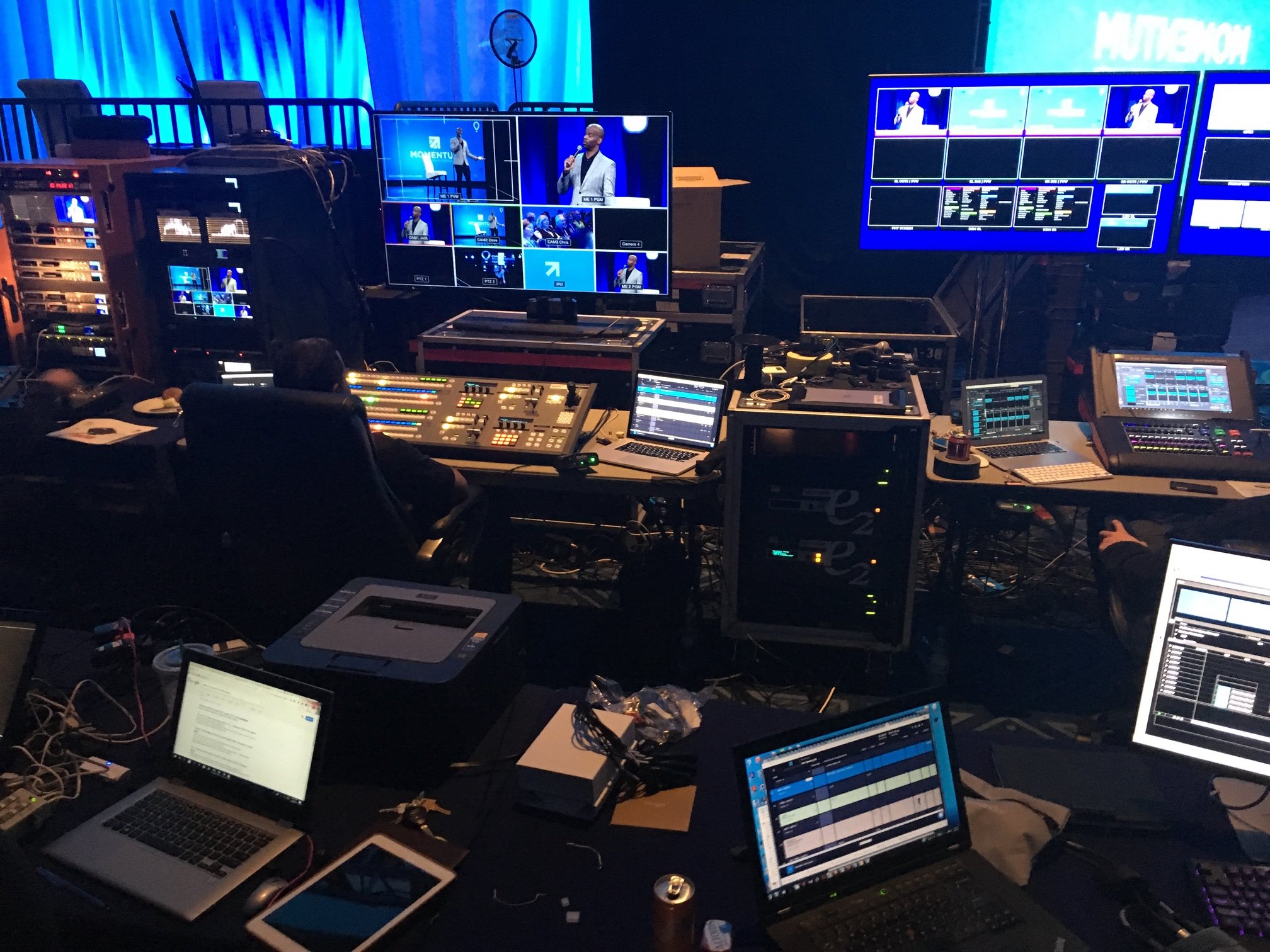Exactly How Event Production Functions: A Comprehensive Look at the Refine
Event production is a facility and structured process that requires careful preparation and execution. It begins with establishing clear goals and recognizing the target market. Each step, from budgeting to place selection, plays a crucial role in ensuring success. As the process unravels, numerous aspects need to line up perfectly. Yet, the nuances of this intricate procedure commonly go unnoticed. What are the vital phases that add to a memorable event?

The Initial Planning Stage
When starting on event production, cautious preparation is vital to guarantee a successful outcome. The preliminary planning stage works as the structure for all succeeding initiatives. During this phase, event producers need to specify the event's objective and purposes plainly. Recognizing the target market aids customize the experience and messaging, ensuring importance and engagement.Producers have to additionally take into consideration the event layout, whether it be in-person, virtual, or crossbreed, as this will certainly affect numerous logistical components. Choosing an appropriate date and location is vital, as it affects access and availability.Furthermore, constructing a dependable team is fundamental for dividing obligations and improving communication. Establishing a timeline with turning points warranties all jobs are completed on schedule. This phase entails detailed research study, consisting of recognizing prospective difficulties and creating techniques to reduce dangers. Ultimately, a well-structured initial preparation stage sets the tone for an effective event production trip.

Budgeting and Resource Allocation
In event production, effective budgeting and source allowance are essential for success - event production charlotte. Establishing financial criteria sets the structure for all succeeding decisions, while source distribution techniques assure that every element of the event is properly sustained. Together, these aspects aid preserve control over expenses and maximize using readily available resources
Developing Financial Parameters
Establishing monetary criteria is important to the success of any event production, as it sets the structure for effective budgeting and source allocation. This process begins with specifying the total budget, which includes all facets of the event, including location prices, catering, and advertising. By recognizing available funds, event organizers can prioritize expenditures and designate sources accordingly. In addition, it is important to perform comprehensive market research study to prepare for possible costs and identify funding sources, such as sponsorships or ticket sales. Establishing clear monetary criteria additionally help in risk management, allowing coordinators to establish apart backup funds for unanticipated expenditures. Inevitably, a distinct budget functions as a roadmap, directing the event production team towards accomplishing their objectives while preserving monetary control.
Source Circulation Methods
Efficient source circulation methods are necessary for making the most of the effect of an event while adhering to budget constraints. Effective event production calls for a thorough technique to budgeting and source allowance. Coordinators should prioritize vital elements such as venue, catering, and technology, ensuring that funds are alloted to locations that improve guest experience. A detailed budget needs to detail expected expenses and recognize locations for potential price savings, such as working out with suppliers or checking out sponsorship opportunities. In addition, tracking expenditures throughout the planning procedure assists prevent overspending. By using tactical source distribution, event manufacturers can provide a memorable experience while keeping fiscal duty, eventually contributing to the total success of the event.
Location Option and Logistics
Selecting the right place is necessary to the success of any event, as it establishes the stage for the total experience. Venue option includes reviewing different variables, consisting of capacity, access, and place. Organizers must think about the target market and the nature of the event, guaranteeing the place aligns with the event's goals.Logistics play a considerable role in this process, including setups for seating, audiovisual devices, and catering solutions. An appropriate location ought to promote smooth flow for guests and staff, enhancing engagement.Additionally, evaluating prospective locations for services like car parking, bathrooms, and fire escape is necessary for safety and benefit. The timeline for securing the location is additionally vital, as prominent areas may reserve quickly - event production charlotte. As a result, comprehensive planning and timely implementation can inevitably add to a smooth event experience, making place option and logistics essential components of successful event production
Creative Idea Growth
While the place establishes the physical phase, imaginative principle advancement forms the event's identification and narrative. This process begins with recognizing the event's function and target market, allowing event producers to create an engaging theme that reverberates with guests. Conceptualizing sessions usually include diverse viewpoints, fostering ingenious concepts that align with the event's goals.Once a style is developed, aesthetic elements such as color combinations, signs, and style are created to improve the general environment. Narration techniques may likewise be integrated to create an engaging journey for participants, assuring a memorable experience. Furthermore, considerations concerning amusement, tasks, and interactive elements are lined up with the picked concept, enhancing the theme throughout the event.Ultimately, effective innovative concept this post growth warranties that every facet of the event functions cohesively, leaving a lasting impression on guests and fulfilling the event's purposes. This fundamental job prepares for subsequent planning and execution stages.
Collaborating With Suppliers and Suppliers
Successful event production rests on effective collaboration with vendors and vendors. Choosing trustworthy partners, negotiating agreements properly, and making certain prompt deliveries are important actions in this procedure. Each of these aspects contributes substantially to the general success and smooth execution of an event.
Selecting Reliable Allies
Just how can event organizers assure a smooth production experience? Choosing trusted partners is important in accomplishing this objective. Event coordinators have to conduct extensive research to determine suppliers and distributors with a proven track document of quality. This consists of inspecting referrals, examining portfolios, and evaluating client feedback. Planners need to focus on companions that show expertise, prompt communication, and a readiness to collaborate. Structure solid connections promotes depend on and allows fast analytic throughout the event. Furthermore, it is valuable to select local vendors that understand the venue and regional logistics. Eventually, an effective event rests on the harmony in between planners and their partners, guaranteeing that every element of production runs smoothly and efficiently.
Discussing Agreements Properly
Efficient negotiation of agreements is an essential action in the cooperation between event planners and their suppliers and distributors. This procedure entails clear interaction of assumptions, deliverables, and timelines. Organizers need to perform comprehensive research on market prices and sector criteria to develop a standard for negotiations. It is crucial to create a collective environment, urging open dialogue concerning terms, rates, and possible backups. Coordinators must additionally prioritize recognizing the supplier's capabilities and limitations to straighten their requirements effectively. Adaptability can bring about mutually valuable agreements, cultivating lasting partnerships. Crafting distinct contracts that consist of details efficiency metrics can assist guarantee accountability, eventually causing successful event execution and fulfillment for all events involved.
Guaranteeing Prompt Shipments
Prompt deliveries are important for the smooth execution of any kind of event, requiring persistent cooperation between planners and their suppliers and vendors. Effective interaction is essential, as it assists establish clear assumptions relating to distribution timetables, quantities, and specific demands. Coordinators typically create thorough timelines to lay out important milestones, making certain all celebrations remain aligned throughout the procedure. Normal check-ins with vendors can aid identify possible hold-ups early, permitting proactive services. Furthermore, building solid relationships with trustworthy suppliers cultivates depend on and responsibility, which can lead to far better solution and prioritization. By focusing on these collaborative initiatives, coordinators can lessen disturbances, thereby enhancing the overall efficiency of event production and making sure that all required materials and solutions get here as intended.
Marketing and Promo Methods
While arranging an event, the success of advertising and marketing and promo methods can significantly affect presence and engagement. Effective approaches often consist of a combination of digital advertising, standard advertising, and grassroots outreach. Using social networks systems enables real-time interaction and targeted marketing, reaching specific demographics effectively. Email advertising projects can additionally engage potential guests with tailored content and reminders.Collaborations with influencers or market leaders can additionally boost reliability and expand reach. Producing appealing content, such as videos or blog go to website sites, aids to create buzz and suffer interest leading up to the event. Additionally, leveraging early-bird discount rates and unique advantages can incentivize ticket purchases.Promoting with standard networks, such as posters or neighborhood media, continues to be relevant, specifically in community-focused events. A comprehensive strategy that incorporates multiple techniques warranties maximum visibility and interaction, ultimately adding to the event's success and the creation of a memorable experience for guests.
On-Site Implementation and Monitoring
On-site implementation and management are crucial parts that figure out the total success of an event. Efficient control throughout the event guarantees that all components align with the planned program. Event managers oversee logistics, consisting of vendor coordination, equipment setup, and visitor services. Keeping an eye on timelines and addressing any kind of unforeseen issues are basic for keeping a seamless experience.The team plays a considerable function, as skilled employees are accountable for various tasks such as enrollment, info dissemination, and technical support. Communication amongst staff member is critical; it cultivates a collective environment and makes it possible for fast resolution of challenges.Additionally, safety procedures have to be complied with, protecting the wellness of all participants. Post-event analyses are also part of on-site administration, supplying understandings for future enhancements. By concentrating on these facets, event producers can create memorable experiences that fulfill or surpass participant assumptions while achieving the event's goals.
Regularly Asked Inquiries
Exactly how Do I Choose the Right Event Motif?
Choosing the ideal event theme includes taking into consideration the target audience, event objective, and venue. Looking into existing trends and gathering input from stakeholders can additionally influence creative ideas that reverberate and produce a memorable experience.

What Are Common Mistakes in Event Production?
Usual blunders in event production typically consist of insufficient planning, bad communication amongst team participants, spending plan mismanagement, neglecting to think about the target market's requirements, and falling short to perform a comprehensive post-event examination for future enhancements.
Just How Can I Gauge Event Success?
To measure event success, one can analyze participant complete satisfaction, involvement levels, budget plan adherence, and post-event responses. Key performance signs, such as ticket sales and social networks interactions, likewise supply valuable understandings into total effectiveness.
What Should I Do if It Moistens the Event Day?
In case of moisten the day, the coordinator ought to apply backup plans, such as securing tents or relocating tasks indoors. Communication with participants about modifications is vital to guarantee a smooth experience regardless of weather difficulties.
Exactly How Can I Make Certain Participant Interaction Throughout the Event?

Comments on “Planning on a budget? Use these event production charlotte hacks”